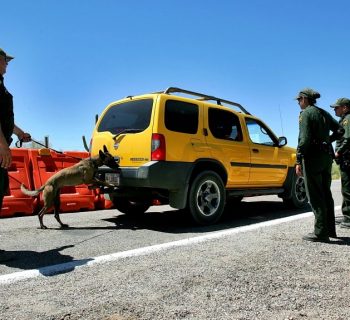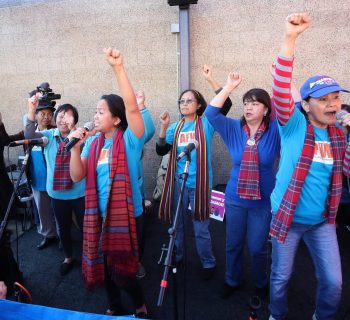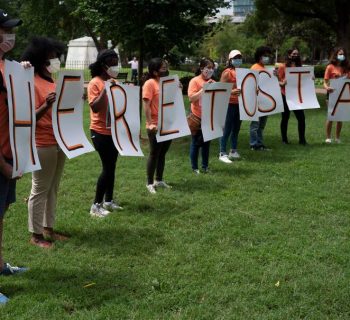By Jack Herrera ~ Pacific Standard ~ August 9, 2018
In a potentially landmark decision, a circuit court judge ruled that the Fourth Amendment should protect Elena Rodriguez, who was a Mexican national killed on Mexican soil.
In October of 2012, a United States Border Patrol agent stood in Nogales, Arizona, and fired his gun across the border at José Antonio Elena Rodríguez. Ten bullets found their way into the 16-year-old's body; eight of them landed in his back. The officer later claimed he made a split-second decision after rocks were thrown at him and other agents: Judging the stones to be life-threatening—Border Patrol agents describe how rocks thrown across the border are often the size of grapefruits—he fired at two "shadowy figures" across the border, killing the Mexican boy.
Since that day, almost six years ago, Elena Rodríguez's mother, Araceli Rodríguez, has pushed to find justice for her son. Along with family members, she has held monthly vigils and given hundreds of media interviews. She's reached out to the families of other people killed by U.S. Border Patrol, and she's filed a lawsuit against the officer, Agent Lonnie Roy Swartz.
Earlier this year, a jury found Swartz not guilty of second-degree murder. But now, as the sixth anniversary of her son's death approaches, a new legal victory for Rodríguez could hold significance for more people than just her son. On Tuesday, a federal circuit court rejected Swartz's immunity claim against the civil rights lawsuit Rodríguez filed against him.
In a landmark decision that could have far-reaching legal consequences, the court ruled that the Fourth Amendment of the U.S. Constitution protected Elena Rodríguez—a Mexican citizen on Mexican soil—from excessive use of force. (The language of the Fourth Amendment establishes the right against unreasonable search and seizure; long-standing legal precedent has interpreted this right to extend to one's body, and protect one against excessive force.) "It is inconceivable that any reasonable officer could have thought that he or she could kill [José Antonio] for no reason," wrote Judge Andrew Kleinfeld in the majority opinion for the Ninth Circuit Court of Appeals.
The court's decision means that Swartz is not immune from a civil rights lawsuit brought by Rodríguez or someone else representing her son's estate. However, the implications could go much further: The ruling implies that the Constitution can stretch across the border and protect foreign citizens in foreign territory. If taken as precedent, the case could have a dramatic impact on the way the law is applied to people on the border and the way the Border Patrol operates.
Since the 1950s, there has been debate in the Supreme Court regarding the extent to which the U.S. Constitution protects non-citizens on foreign land. As Gerald Neuman—a Harvard University law professor who filed an amicus brief in the Ninth Circuit case—explains, the circuit court's decision follows precedents that arose after foreign nationals were detained without trial by the U.S. government in Guantanamo Bay in the aftermath of 9/11. In 2008, the Supreme Court ruled that Guantanamo prisoners maintained certain constitutional rights, such as the right to trial.
Though Neuman explains that the legal precedent is complicated, and that the "practicability" of applying constitutional rights to foreign nationals is determined on a case-by-case basis, he says that this specific case was clear: "Using the standards that the Supreme Court had articulated in recent opinions, there was no reason why the Fourth or Fifth Amendment should not condemn a cross-border killing by a Border Patrol agent standing in Arizona, killing someone standing just across the border in Mexico, regardless of what nationality that person was."
In his opinion, Kleinfeld partially agreed with Neuman, and held that Swartz "violated a clearly established constitutional right": the Fourth Amendment right, which, in part, protects against excessive force. The Ninth Circuit decision did not establish whether Elena Rodríguez's right to life—as established by Fifth Amendment—was also violated.
Joanna Williams, the director of education and advocacy for the Kino Border Initiative(a binational advocacy group that supports migrant rights on both sides of the Nogales border), says that the case felt like a small victory in a much larger battle. Kino has worked closely with Rodríguez and her family since her son's killing. "I don't want to say the family is exhausted, but they have certainly tried almost every opportunity to find justice," Williams says.
Williams also says that the jury decision earlier this year—the one that found Swartz not-guilty of second-degree murder—fell into a what she sees as "long history of injustice" along the border. However, Swartz is yet to be found innocent of all wrongdoing: Williams notes that the jury was hung on two lesser manslaughter charges, and another trial is cast for this October.
Additionally, the criminal trials will not consider whether Swartz violated Elena Rodríguez’s constitutional rights. That question will be decided in the civil trial Swartz will now face against the teenager's mother. Rodríguez, who is representing both herself and her son's estate, accuses Swartz of acting as judge, jury, and executioner in her son's death.
Though that trial is now imminent, Neuman says he already feels heartened by the Ninth Circuit Court's ruling. "At this moment in history, it's very good to have a judicial decision that comes out and says that Border Patrol agents cannot engage in unprovoked killings of people standing immediately across the Mexican border—and just because they're across the Mexican border," he says.
Source: Jack Herrera ~ Pacific Standard ~ August 9, 2018







